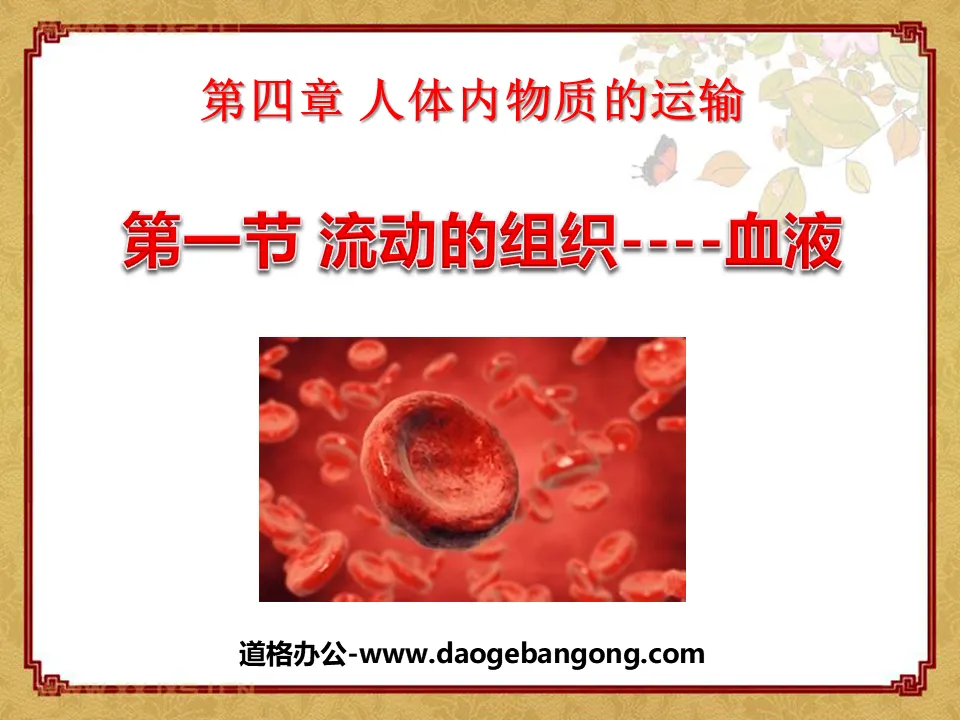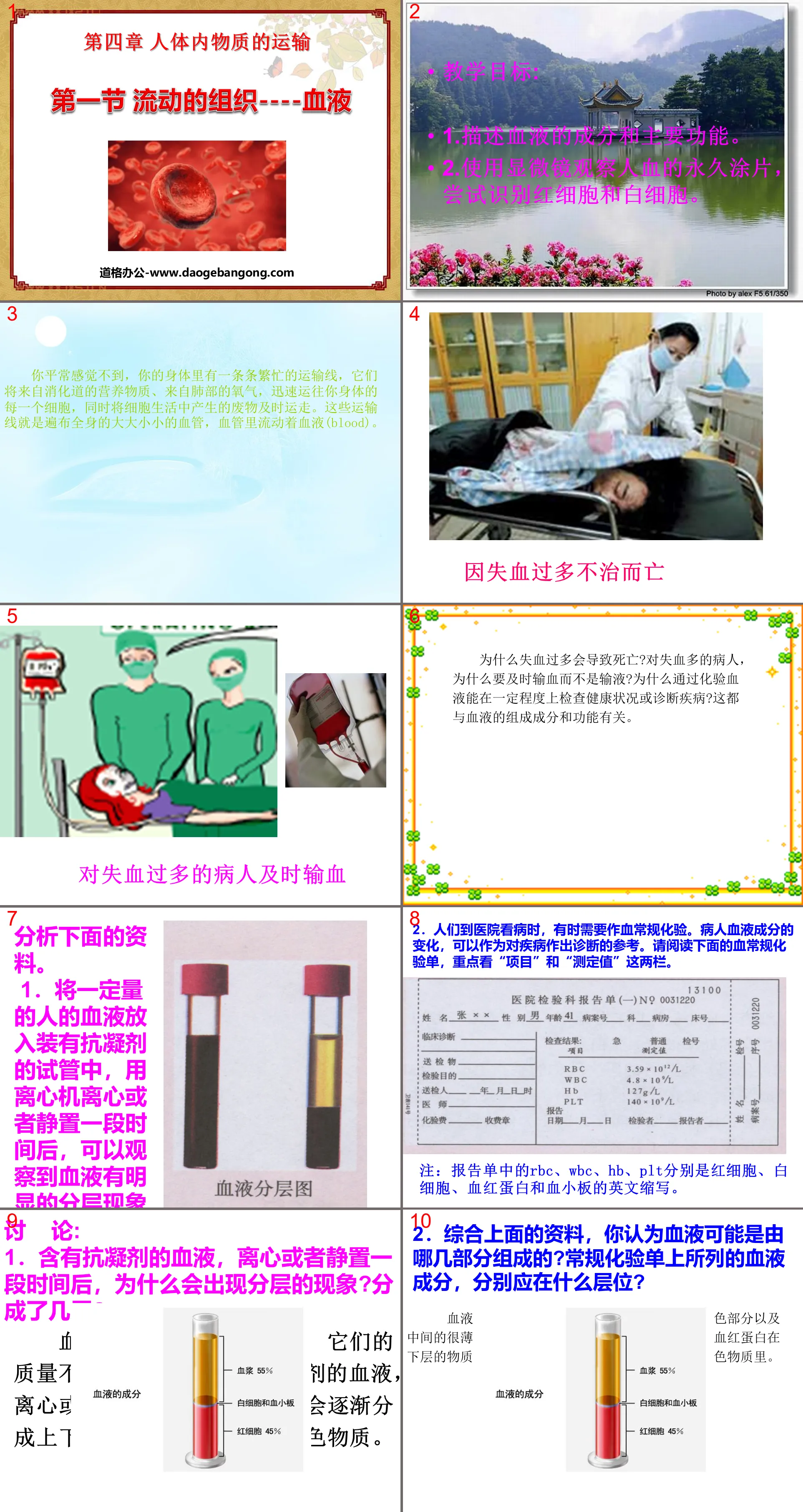People's Education Edition Biology for Grade 8, Volume 1
People's Education Edition seventh grade biology volume 1
People's Education Edition Biology for Grade 8, Volume 2
Beijing Normal University Edition Seventh Grade Biology Volume 2
People's Education Press High School Biology Compulsory Course 2
People's Education Press seventh grade biology book volume 2
Beijing Normal University Edition Eighth Grade Biology Volume 2
Beijing Normal University Edition Seventh Grade Biology Volume 1
Beijing Normal University Edition Eighth Grade Biology Volume 1
High School Biology Compulsory Course 1, published by People's Education Press
Jiangsu Education Edition Seventh Grade Biology Volume 1
Jiangsu Education Edition 8th Grade Biology Volume 1
Jiangsu Education Edition Seventh Grade Biology Volume 2
Jiangsu Education Edition 8th Grade Biology Volume 2

| Category | Format | Size |
|---|---|---|
| People's Education Press seventh grade biology book volume 2 | pptx | 6 MB |
Description
"Flowing Tissue-Blood" Transportation of Materials in the Human Body PPT Courseware
teaching objectives:
1. Describe the components and main functions of blood.
2. Use a microscope to look at a permanent smear of human blood and try to identify red blood cells and white blood cells.
You usually don’t feel it, but there are busy transport lines in your body. They quickly transport nutrients from the digestive tract and oxygen from the lungs to every cell in your body, and at the same time, they transport waste products produced in cellular life. Shipped away in time. These transportation lines are large and small blood vessels throughout the body, and blood flows in the blood vessels.
Analyze the following information.
1. Put a certain amount of human blood into a test tube filled with anticoagulant, and after centrifugation with a centrifuge or letting it sit for a period of time, you can observe obvious stratification of the blood (see the picture on the right).
2. When people go to the hospital to see a doctor, they sometimes need to do routine blood tests. Changes in the patient's blood components can be used as a reference for diagnosing the disease. Please read the following blood routine test sheet, focusing on the "Items" and "Measurement Values" columns.
Note: RBC, WBC, Hb, and PLT in the report form are the English abbreviations of red blood cells, white blood cells, hemoglobin, and platelets respectively.
discuss:
1. Why does blood containing anticoagulants stratify after centrifugation or standing for a period of time? How many layers does it separate into?
Blood contains different components and their qualities are different. Therefore, after centrifugation or standing for a period of time, blood containing anticoagulants will gradually divide into two layers, upper and lower, and a thin layer of white substance in the middle.
2. Based on the above information, what parts do you think blood may be composed of? At what levels should the blood components listed on the routine laboratory test sheet be located?
Blood is composed of an upper layer of light yellow translucent liquid, a lower layer of dark red liquid, and a thin layer of white material in the middle. The red blood cells and the hemoglobin they contain are in the lower layer of material, and the white blood cells and platelets are in the thin layer of white material in the middle.
3. Why is blood called “flowing tissue”?
There are a large number of blood cells in the blood. These cells and plasma together constitute the blood and complete functions such as material transportation. Therefore, the blood is a kind of tissue and belongs to the connective tissue. Blood can flow, hence the name "fluid tissue."
Composition and functions of blood
plasma
Ingredients: water, glucose, amino acids, inorganic salts, plasma protein, urea, etc.
Function: Carry blood cells, transport nutrients and waste products produced in the body
blood cells
Red blood cells function: transport oxygen
White blood cell function: phagocytosis of bacteria, immune function
Platelet functions: coagulation, hemostasis
After-class exercises P71
1. When people sweat profusely or have severe diarrhea, what are the main components lost in the blood? What methods are usually used to replenish these components lost in the blood?
During heavy sweating, the blood mainly loses water and inorganic salts. Drinking water and appropriate amounts of inorganic salts are usually used to replenish these components lost in the blood. In severe diarrhea, the human body mainly loses nutrients such as water, some inorganic salts, and glucose. Methods such as drinking water, supplementing appropriate amounts of inorganic salts, and intravenous drip (or oral) glucose solution are usually used to replenish these components lost in the blood.
2. Anemia occurs when there are too few red blood cells or hemoglobin in the body. What symptoms do you think patients with anemia will exhibit? Depending on the composition of the hemoglobin, what can be done to alleviate these symptoms?
The symptoms of anemia patients are: pale complexion and dizziness, fatigue, palpitations, impatientness and other symptoms. Hemoglobin is an iron-containing protein. Generally speaking, patients with anemia should eat more iron-containing foods and protein-rich foods.
Class exercises
1. Which of the following groups contains substances that should not be present in plasma ( )
A. Water, enzymes, inorganic salts, platelets
B. Vitamins, glucose, hormones
C.Amino acids, carbon dioxide, plasma proteins
D. Oxygen, urea, phospholipids
2. Arterial blood is red mainly because it contains more ( )
A. Red blood cells B. Hemoglobin combined with oxygen
C.Nutrient D.Carbon dioxide
3. Use a microscope to observe the blood smear. The largest number of cells seen in the same field of view is ( )
A. White blood cells B. Red blood cells C. Platelets D. Lymphocytes
4. Which of the following cells can swim in tissue fluid ( )
A.Red blood cells B.Adipocytes
C. White blood cells D. Sperm cells
5. The group of mature blood cells in the human body that does not have a nucleus is ( )
A. Red blood cells and white blood cells B. Platelets and white blood cells
C. Platelets and red blood cells D. Blood cells and red blood cells
6.Anemia refers to ( )
A. Too little blood in the human body
B. Too few nutrients in the blood
C. Too few white blood cells or platelets in the blood
D. The number of red blood cells in the blood is too low, or the hemoglobin content in the red blood cells is too low.
Keywords: Teaching courseware on the transportation of substances in the human body, teaching courseware on flowing tissue and blood, Biology PPT courseware for the second volume of the seventh grade of the New People’s Education Edition, downloadable biology slide courseware for seventh grade, downloading PPT courseware on the transportation of substances in the human body, flowing tissues Blood PPT courseware download, .ppt format
For more information about the PPT courseware "Transportation of Substances in the Human Body and the Flow of Tissues and Blood", please click on the "Transportation of Substances in the Human Body PPT ppt Flow of Tissues and Blood" tag.
"Flowing Tissue-Blood" Transport of Materials in the Human Body PPT Courseware 5:
"Flowing Tissue - Blood" Transport of Materials in the Human Body PPT Courseware 5 Learning Objectives: 1. The components of blood; 2. Understand the functions of plasma and blood cells. Independent learning, independent answers: 1. What tissue of the human body is blood, and what functions does it have? 2. Blood is made of...
"Flowing Tissue-Blood" Transport of Materials in the Human Body PPT Courseware 4:
"Flowing Tissue - Blood" Transport of Substances in the Human Body PPT Courseware 4 Learning Objectives The stratification phenomenon of blood Interpretation of routine blood test sheets The composition and main functions of plasma Use a microscope to observe permanent pictures of human blood and identify red blood cells, white blood cells, and platelets Understand ..
"Flowing Tissue-Blood" Transportation of Materials in the Human Body PPT Courseware 3:
"Flowing Tissue - Blood" Transport of Materials in the Human Body PPT Courseware 3 Learning objectives of this section: 1. Describe the components of blood and the main functions of each component. 2. Ability to identify red blood cells and white blood cells in human blood smears based on the shape and number of blood cells. 3. Ability to root...
File Info
Update Time: 2024-11-19
This template belongs to biology courseware People's Education Press seventh grade biology book volume 2 industry PPT template
"Flowing Tissue-Blood" Transportation of Materials in the Human Body PPT Courseware Simple campus recruitment activity planning plan summary enterprise and institution recruitment publicity lecture PPT template is a general PPT template for business post competition provided by the manuscript PPT, simple campus recruitment activity planning plan summary enterprise and institution recruitment promotion Lecture PPT template, you can edit and modify the text and pictures in the source file by downloading the source file. If you want more exquisite business PPT templates, you can come to grid resource. Doug resource PPT, massive PPT template slide material download, we only make high-quality PPT templates!
Tips: If you open the template and feel that it is not suitable for all your needs, you can search for related content "Flowing Tissue-Blood" Transportation of Materials in the Human Body PPT Courseware is enough.
How to use the Windows system template
Directly decompress the file and use it with office or wps
How to use the Mac system template
Directly decompress the file and use it Office or wps can be used
Related reading
For more detailed PPT-related tutorials and font tutorials, you can view: Click to see
How to create a high-quality technological sense PPT? 4 ways to share the bottom of the box
Notice
Do not download in WeChat, Zhihu, QQ, built-in browsers, please use mobile browsers to download! If you are a mobile phone user, please download it on your computer!
1. The manuscript PPT is only for study and reference, please delete it 24 hours after downloading.
2. If the resource involves your legitimate rights and interests, delete it immediately.
3. Contact information: service@daogebangong.com
"Flowing Tissue-Blood" Transportation of Materials in the Human Body PPT Courseware, due to usage restrictions, it is only for personal study and reference use. For commercial use, please go to the relevant official website for authorization.
(Personal non-commercial use refers to the use of this font to complete the display of personal works, including but not limited to the design of personal papers, resumes, etc.)
Preview










